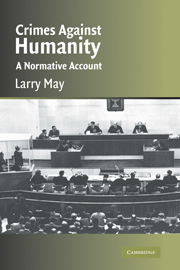Conclusions
Published online by Cambridge University Press: 23 November 2009
Summary
Throughout this book, I have argued that international criminal law is in need of conceptual clarification and normative support, especially so that it can better take into account the rights of the defendants. The point of this book has not been to add fuel for those who wish to burn down the still “under construction” edifice of international criminal law. I do not agree that we are better off without, than with, an International Criminal Court. Indeed, I support the effort to add new international institutions generally. Instead, this book has attempted to investigate the normative foundations of such institutions. That the normative support has been found to be partially wanting in various ways is no reason to reject the whole project. Rather it is reason to scale back the project, and focus on those defendants who have clearly violated international criminal law and who cannot support a defense of superior orders or duress.
International justice is not an oxymoron; it can be philosophically explicated and defended. There are indeed jus cogens norms of international criminal law, norms that proscribe genocide, apartheid, slavery, and discrimination, as well as group-based torture, murder, and rape. But the list of international crimes does not extend so far as to include all supposed human rights abuses, especially those that are not group-based. International tribunals should not prosecute in-dividualized human-rights abuses as crimes against humanity.
- Type
- Chapter
- Information
- Crimes against HumanityA Normative Account, pp. 254 - 258Publisher: Cambridge University PressPrint publication year: 2004

